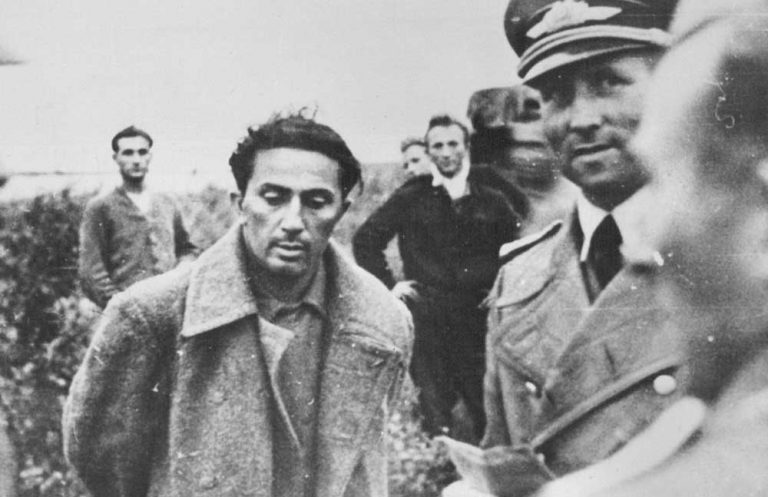
Joseph Stalin died in March 1953, aged 75, leaving behind little evidence to suggest that he lamented the death of his eldest child
James Barker
Shortly after the defeat of Nazi Germany in May 1945, Allied military intelligence agents unearthed a container of top secret files in the garden of a senior German diplomat. One set of microfilmed documents contained a report into the shooting of a Soviet prisoner of war by an SS guard at Sachsenhausen concentration camp on 14 April 1943. The victim was a 36-year-old Red Army artillery lieutenant named Yakov Dzhugashvili.
There was nothing remarkable in the death of a Soviet soldier in Nazi captivity. In the first 12 months of Adolf Hitler’s invasion of the USSR, an estimated 2.8 million Red Army prisoners had succumbed to starvation, exposure and disease while in German hands. However, as the SS report made clear, Yakov Dzhugashvili was no ordinary prisoner. He was the eldest son of Joseph Vissarionovich Dzhugashvili, better known to the world as Joseph Stalin.
Aware of the significance of the death of such a high-status prisoner in his custody, the SS chief Heinrich Himmler forwarded the report to the foreign minister, Joachim Ribbentrop, on 22 April 1943, claiming that Dzhugashvili had died while trying to escape. Ribbentrop prudently decided not to release the news to the Nazi press and the report was duly filed away. Had it not been removed from Berlin in the final month of war in Europe along with other German state documents, Himmler’s report might never have survived. Once in Allied hands, it was dispatched to London for proper examination.
Not much was known in the British Foreign Office about Stalin’s eldest child. Dzhugashvili was born in March 1907 to Stalin’s first wife, Ekaterina neé Svanidze. Ekaterina succumbed to tuberculosis when he was only a few months old, leaving him in the care of an aunt in Georgia. Father and son would not meet again until almost four years after the October Revolution in 1917, by which time Stalin was a rising star in the Bolshevik regime.
When he joined his father in Moscow, the 14-year-old Yakov could barely speak a word of Russian. Stalin came to regard his son as a weakling unworthy of his affection or respect. On being told that Yakov had tried to kill himself with a pistol over an unhappy love affair, Stalin scornfully exclaimed, ‘He can’t even shoot straight!’ The one bright spot in Yakov’s life was his father’s second wife, Nadezhda Alliluyeva. Yakov regarded Nadezhda, who was only six years older than him, as more like a devoted sister than a stepmother. In November 1932, she killed herself. Some whispered that the cause was her despair over the effect of Stalin’s ruthless policies on the Soviet people; others secretly opined that it was the revulsion she felt for her husband.
With Nadezhda’s death, Yakov lost an important ally in his father’s inner circle as well as a dear friend. He managed to escape Stalin’s bullying several years later by joining the Red Army. The move had fateful consequences. Shortly after the start of Nazi Germany’s invasion of the Soviet Union on 22 June 1941 his artillery unit was annihilated and he was taken prisoner. Having established Yakov’s identity, his captors gleefully announced the news to the world. However, he adamantly resisted all their attempts to get him to denounce his father’s regime.
In early 1943, the Germans offered to swap Yakov for Field Marshal Friedrich Paulus, whom the Red Army had captured at Stalingrad. Stalin allegedly turned the offer down, saying: ‘I will not trade a Marshal for a Lieutenant.’ By this time, Dzhugashvili was being held at Sachsenhausen concentration camp outside Berlin in a special compound for ‘prominent persons’ and persistent Allied escapees. Here he shared a hut with another Soviet officer, Vassily Kokodin, a nephew of Stalin’s foreign minister, Vyacheslav Molotov, and with four British prisoners of war.
Compared with the conditions endured by the rest of Sachsenhausen’s inmates, their quarters were comfortable. However, the SS report into Yakov’s death mentioned frequent disagreements between the two Soviet prisoners and their reluctant British companions that made him seriously depressed. The final straw seemed to have been the accusation from the Britons that Dzhugashvili and Kokodin had deliberately fouled the communal latrine. Just before nightfall on 14 April 1943 Yakov strode out of his hut towards the surrounding electrified barbed wire fence. According to the SS report, a sentry ordered him to halt. When he refused, the sentry, obeying standing orders, opened fire, killing him instantly. Yakov’s actions were those of a man bent on suicide.
As officials in Whitehall waited for a full translation of the SS report, they discussed with US diplomats the idea of informing Stalin how his son had died. The conference between Stalin, Winston Churchill and Harry Truman at Potsdam in July 1945 seemed to be ideal for this purpose. However, once the complete document had been studied, the Foreign Office quickly abandoned the plan, with one diplomat concluding that he and his colleagues ‘do not think the evidence would give [Stalin] any comfort and it would be naturally distasteful to us to draw attention to the Anglo-Russian quarrels which preceded the death of his son’.
The file on Dzhugashvili was closed and its contents would remain a secret until it was declassified three decades later. Did Stalin ever discover how his son died? In January 1951, The Daily Telegraph ran a report about ‘a curious quest by Russian agents in Germany’ to investigate Yakov’s disappearance, with a reward of one million roubles for a definite lead. No follow-up story ever appeared.
Joseph Stalin died in March 1953, aged 75, leaving behind little evidence to suggest that he lamented the death of his eldest child any more than he had mourned those who had perished while he ruled over the Soviet Union.
_____________________
James Barker is a freelance television producer.
Courtesy: History Today (Published on 4 April 2023)